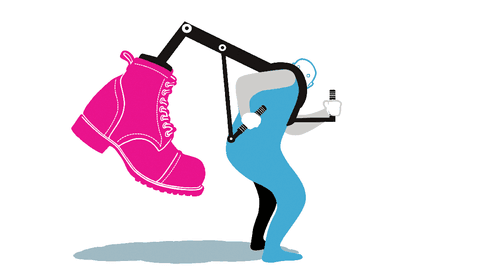How to Keep Working When You’re Just Not Feeling It
Curated from: hbr.org
Ideas, facts & insights covering these topics:
9 ideas
·66.2K reads
617
Explore the World's Best Ideas
Join today and uncover 100+ curated journeys from 50+ topics. Unlock access to our mobile app with extensive features.
Motivation Is Personal
Few people are fans of persistent effort, trying to sustain oneself through any task or project. Effective self-motivation is something that sets normal people apart from high-achievers.
While motivation is a personal effort, there are certain key factors that can help most of us who are trying to lose weight, save, or working on a challenging initiative.
2K
14.5K reads
Rewarding Goals
One has to set goals that feel rewarding and interesting while being specific. Just having to know that you have to go to the gym may feel like a chore, but setting a goal of running 10,000 steps or doing 20 reps feels like a rewarding challenge.
In cases where one would find nothing interesting about the activity, and still has to do it, one can find certain elements of the work that may have fringe benefits.
1.96K
8.42K reads
Intrinsic Vs Extrinsic Motivation
Goals should have intrinsic motivation, something that stokes our fire from within.
If people choose goals that are pleasant, the work gets done. On the other hand, if the external reward is big enough, people do unpleasant tasks as well, but not with enthusiasm. Example: Working only for the monthly wage (the extrinsic motivation) turns many people into ‘wage slaves’ who put in the minimum effort necessary to earn their income.
1.89K
7.51K reads
Choose Your Reward
If you are trying to lose weight and reward yourself with a pizza every time you complete a milestone, the hard work is likely to be undone soon. Achievement of goals is not an incentive for indulgence.
1.88K
7.62K reads
Uncertain Rewards Are Better
Research shows that uncertain rewards are a better external motivator than those which are certain. People are willing to invest more time, money and effort into something that feels thrilling.
Example: A chance to win anything between $50 to $150 creates a greater motivation than an assured win of $100 on completion of the task.
1.89K
6.42K reads
Loss Aversion
A backwards technique of motivation is exploiting the preference to avoid losses over acquiring gains. Making people aware that they will lose something if the activity isn’t completed is a fear-based but effective method of external motivation.
Example: Making people pay a fine if they don’t walk a certain amount of steps in a day makes them complete their target.
1.86K
6K reads
Sustaining Progress
- Most people working towards a goal witness periods of motivation(like in the beginning) and a slump(somewhere around the middle).
- One way to overcome this slump is to have smaller goals or subgoals that give no time for a slump to happen.
- Another way is to chart out the progress in such a way that it is fully visible and the end of the goal is in sight, creating an illusion to work just a bit more and get further towards the goal.
Example: The coffee stamps that indicate a person is just two coffee purchases away from earning a reward triggers more coffee consumption.
1.93K
5.1K reads
Motivation Using The Influence Of Others
As humans are social creatures, we consciously and unconsciously imitate the mannerisms, actions and habits of those around us.
Watching the ambitious, efficient and highly successful coworkers can sometimes backfire, as it can feel demotivating. One has to look at the thing which is being sought after, the achievement that one is moving towards, and talk to the successful person to find their motivation.
1.76K
4.97K reads
Giving And Taking Advice
For people struggling to find motivation, taking advice sometimes is less effective than actually giving it. By giving advice to others, they internally solidify their learnings and turn towards following it themselves, increasing their own drive and achievements.
Example: Teaching a subject to others makes us learn the subject more, than simply reading about it.
1.86K
5.63K reads
IDEAS CURATED BY
Luciana Owain's ideas are part of this journey:
Learn more about personaldevelopment with this collection
Identifying and eliminating unnecessary expenses
How to negotiate better deals
Understanding the importance of saving
Related collections
Similar ideas
3 ideas
Read & Learn
20x Faster
without
deepstash
with
deepstash
with
deepstash
Personalized microlearning
—
100+ Learning Journeys
—
Access to 200,000+ ideas
—
Access to the mobile app
—
Unlimited idea saving
—
—
Unlimited history
—
—
Unlimited listening to ideas
—
—
Downloading & offline access
—
—
Supercharge your mind with one idea per day
Enter your email and spend 1 minute every day to learn something new.
I agree to receive email updates

